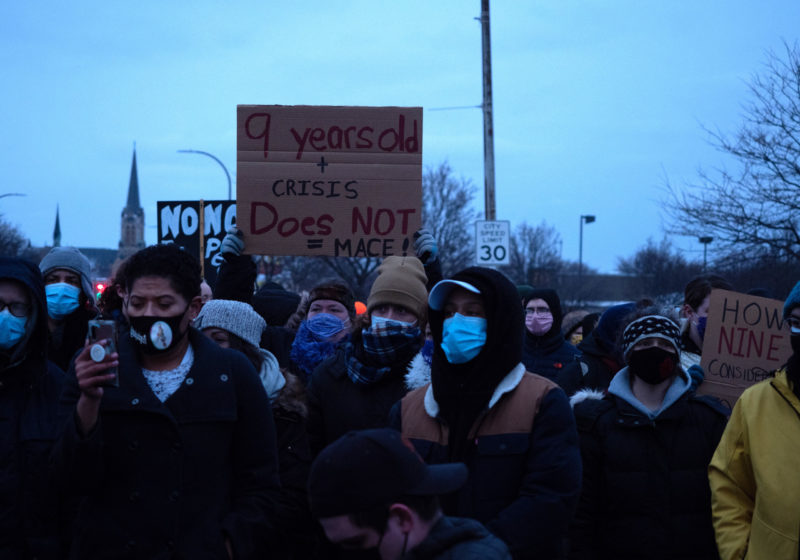You’d think that a national scandal involving the heinous pepper-spraying of a 9-year-old girl on Jan. 29 would have been enough to elicit some form of systemic change. You’d expect to see reforms that would prevent the police from ever physically or mentally harming a child again.
But not even a month after that tragedy, the Rochester Police Department (RPD) is under fire once more for an incident involving a 3-year-old and more pepper spray.
The incident in question took place on Feb. 22, when RPD officers responded to a reported theft at a Rite Aid. The woman accused of the theft was taken down after attempting to run away, and when she reached for her 3-year-old child, she was promptly pepper-sprayed and subdued with her daughter in close proximity to the spray. Both this altercation and the one involving the 9-year-old were caught on police body cameras.
While we’re getting empty words from Mayor Lovely Warren about the “disturbing” new footage and the plans “to make sweeping, but necessary, policy and procedure changes” in the RPD, nothing actually seems to be getting done.
The real question here is what’s so different about the Feb. 22 incident that makes Mayor Warren suddenly want to implement these plans. Why wasn’t this issue dealt with when the first child was brutalized by the RPD? Has anything changed about the system within the 25 days between these two awful and disturbingly similar incidents?
According to Executive Deputy Chief of the RPD Andre Anderson, the department was “in the process of reviewing many policies and looking to make changes” during a press conference just before the release of the Jan. 29 body camera footage. Why had these changes not been implemented before another Rochester child was put in harm’s way by the people employed to protect her?
One could argue that Rome wasn’t built in a day, but the RPD has already had at least 25 days. They’ve had almost four weeks to implement some reform to protect those they’re obligated to serve.
Policies that directly impact the protection and potential life-saving efforts of people should be implemented as soon as possible to avoid issues from occurring multiple times. And those recommendations are being made by multiple political scientists across the nation. However, according to those same experts, many of these recommendations don’t get approved for upwards of four years.
The Democrat & Chronicle reported on the new policies “in the works” at the RPD, but none of them mention the use of irritants like pepper-spray in situations involving children. These changes include vital reforms of procedures involving handcuffing or using chokeholds against juveniles. Those changes are absolutely necessary and valid, but it’s ridiculous that none of them involve the topic of interest that has placed this unwanted spotlight on the RPD.
So, what can be done to address this issue? Is the solution really as simple as banning the use of irritants against minors?
New York state lawmakers certainly hope so. Soon after city officials released the Jan. 29 footage to the public, the State Senate moved swiftly to propose an amendment to current state law which would ban the use of all irritants (including pepper-spray) against minors under any circumstances. But it seems that this effort didn’t come fast enough.
Had this amendment been expedited and implemented through New York state’s legislature soon after the first incident, a 3-year-old girl wouldn’t have had to witness her mother being tackled by RPD, nor would she have been dangerously close to pepper-spray.
The question now is whether the incident on Feb. 22 is going to elicit the change needed to protect Rochester’s children. Considering the RPD’s track record, I wouldn’t be surprised if the next 25 days see more horrific body camera footage of a Black child’s dehumanization.






